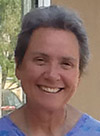Call within a call: Your vocation and a career
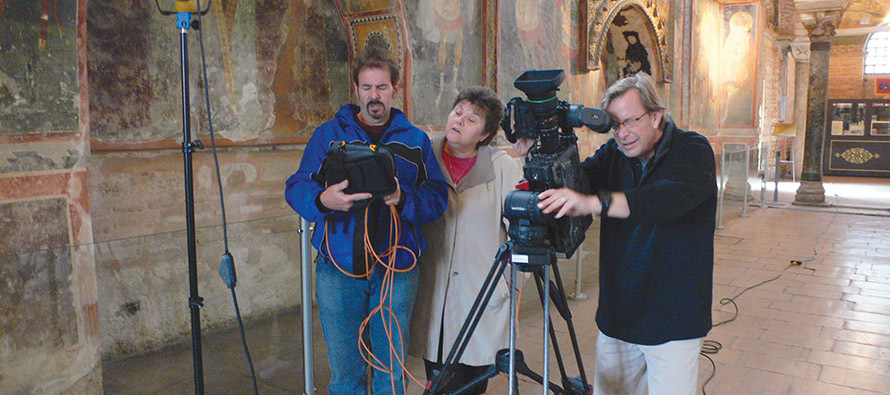
Sister Judy Zielinski, O.S.F. is a video writer, producer, and documentary filmmaker who specializes in faith and values-related programming. Here she works with a crew filming murals in a church near Istanbul. (Photo courtesy of New Group Media.)
I WAS SO CLEAR about my call to be a family physician. I had been accepted to medical school. I desired to serve those most in need of healthcare—people I had met at a free clinic sponsored by an inner-city parish and where I volunteered in high school. The doctors, nurses, and other parishioners who served the sick in the evenings at the clinic taught me that healthcare is a basic human right and that my faith calls me to be sure that everyone has access. That was my calling.
During college I also began to notice within myself a growing curiosity about religious life. The sisters who taught many of my classes and lived on campus were dedicated professionals and academics with a spiritual side that showed in their interactions with students, staff, and colleagues. Some lived in the college convent, others on the floors of the dorm, others in small groups in homes across the road from the school. I was intrigued, but I felt I was removed from them because in my understanding, “Sisters couldn’t be doctors.”
Don’t limit your possibilities
Many young adults, students, and professionals make the same assumption I did—that ministry work for religious sisters and brothers has a fairly narrow scope: teaching, nursing, parish life, or other church-related services. I thought that becoming a sister, brother, or priest meant giving up most other professional paths and very likely the freedom to have any say about it. Not true!
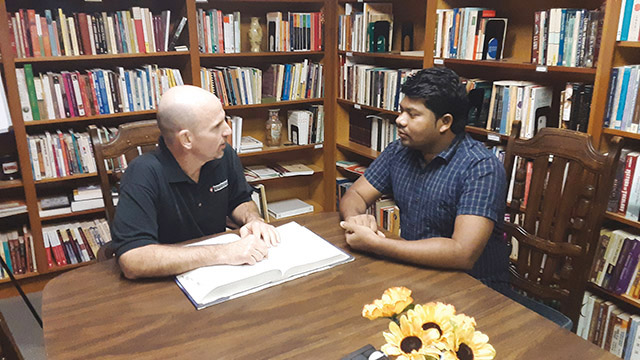
A story in a diocesan newspaper about a Franciscan sister who was in a family practice medical residency awakened me to the possibility that I might have “a call within a call.” There were sister-doctors. Uh-oh! There are also sister-lawyers, sister-veterinarians, sister-cello professors—in short, the People of God need all of these ministries, and religious women and men can respond with great freedom and creativity according to their abilities. The active apostolic life can support the diversity of gifts young adults offer today.
Even communities with a very specific focus, like nursing the elderly, service to immigrants, or education, can many times incorporate persons with a breadth of professional training and skills. The sense of a call to serve in a particular profession can help in the discernment process by narrowing the field of congregations you may want to consider.
Challenges and opportunities
Incorporating new members with professional training can have special challenges for religious communities. Educational debt is an issue that congregations are trying to help candidates address (see the box below). Another challenge can be negotiating the demands of a career or training program within the structures of formation for religious life.
In some ways it is important to discover early in the discernment process whether your professional commitment blends well with the life of the congregation. During the time of considering and then beginning religious life, many communities negotiate the give-and-take of religious life and professional work. In my case the three years of medical residency training were ideal for an extended candidacy period—when those joining religious communities can observe and participate in religious life from the inside—allowing for nights on call at the hospital and a more gradual introduction to life in community.
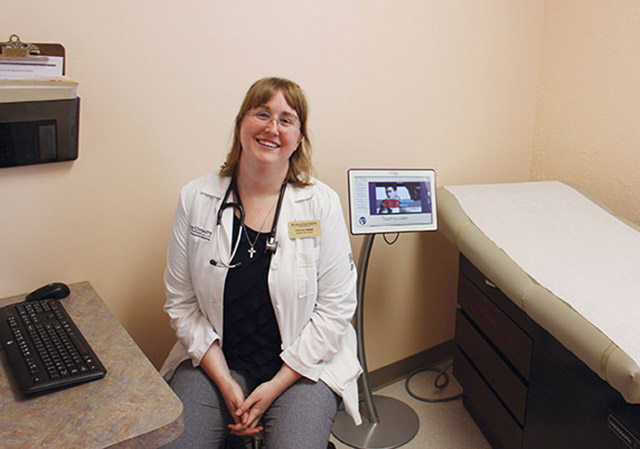
Time to take the plunge
At some point, however, the seriousness and requirements of your commitment to religious life must take priority. A year or so away from the demands of professional training won’t ruin a professional life but will build the solid foundation required for consecrated life. Taking some time off during initial formation is not so different from choosing to be a stay-at-home mom or dad for a while, as did several of my colleagues in medicine. My novitiate year—a period of discernment, preparation, and formation activities before taking temporary vows—began just after completing my medical residency, and to be honest I looked forward to the immersion into the deep story of my congregation and to the opportunity for prayer and study of the vows. The reentry to full-time work was exciting, and I felt that my novitiate period helped me to integrate my call within a call.
Each religious community determines its own policies regarding debt, so a concern about student debt should be part of any serious, advanced-stage conversation between you and a religious order. The National Fund for Catholic Religious Vocations (NFCRV) helps Catholic religious communities accept candidates with student debts. NFCRV works with individual communities, rather than directly with candidates. Learn more at nfcrv.org. (Note: NFCRV was established by the National Religious Vocation Conference, which publishes VISION.)
Congregations with members in the profession for which you are prepared have experience working with issues such as liability insurance and ongoing educational and licensing requirements. Vocation ministers can put you in contact with vowed members who have navigated the waters ahead of you, and these people can be valuable resources. Organizations of professionals have annual meetings and provide regional networking possibilities to support the integration of professional life and religious commitment.
Vocation forms your career
A religious vocation can reshape your career in surprising ways. Religious congregations are continually evaluating their ministries as they reflect on the signs of the times, listening for the call of their charism—their particular focus and spirit—in the light of the gospel. There are traditional needs in community-sponsored ministries such as schools and hospitals, but new projects spring up that require fresh eyes and new skills. A psychologist might work with veterans or women released from prison. An accountant can handle the financial side of a struggling social service agency. Sometimes the formation experience itself illuminates new interests or aptitudes through opportunities for growth in self-knowledge.
Many occupations can be put to good use for the sake of the Kingdom. What could God do with yours?
A version of this article originally appeared in Vision 2015. Related article: VocationNetwork.org, “The creative spirit finds expression in religious ministries.”
Remembering Sister Janet: A perfect blend of career and vocation
Sister Janet Gildea, S.C. first met the Sisters of Charity when attending the College of Mount St. Joseph in Cincinnati in 1974. During her years at the Mount, she experienced the hospitality of the Sisters in sharing opportunities for spiritual growth and friendship while also discerning God’s call. The [plan] was to continue her studies in preparation for service as a physician, but hand-in-hand came the invitation to vowed life as a Sister of Charity. Janet entered the Congregation in 1982, and that same year graduated from Indiana University’s School of Medicine.
Janet’s ministries included 35 years of medical service to the poor in Kentucky, New Mexico, Texas, and Anapra, Mexico. In 1991 Janet became medical director at San Vicente Clinic near El Paso, Texas, and four years later she co-founded La Clinica Guadalupana for families living in desperate poverty on both sides of the U.S.-Mexico border. This ministry expanded to provide much-needed assistance for children with special needs through the Santo Niño Project in Anapra, Mexico.
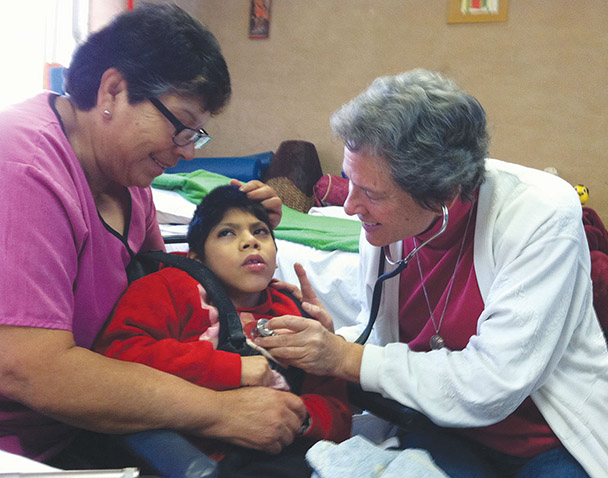
She would remain at the border the remainder of her life, learning from the people about perseverance, courage, creativity, and celebration. As Janet explained, “They gave me Our Lady of Guadalupe and taught me to experience the gospel from the perspective of God’s favorite people—the poor. Serving her most beloved children I am learning lessons of compassion, advocacy, accompaniment, and radical dependence on God.”
Helping young women pursue their call
Another aspect of the call to religious life for Janet was the desire to help other young women pursue a call to service that could also include a call to vowed life. She saw great value in the outreach-service component that young people offer the world in their desire to make it a better place. To add to their contributions she and initial formation/vocation teams in the Sisters of Charity Federation eventually [established] a program for young women returning from volunteer mission experiences after college. The program, known as AVE (After Volunteer Experience) offers participants the opportunity to live in community, receive spiritual direction, career and individual counseling, and take time to discern the “what to do next” with their lives. Learn more at srcharitycinti.org/join-our-mission/ave-2/.
Janet’s own words speak of the woman she was and the passion she felt for religious life today: “There are so many needs for which religious women are uniquely positioned to respond. For those who desire to serve Jesus in the poor, to deepen their relationship with God, and to live in a community of faith, being a sister is a wonderful option and a great adventure.”
Excerpted with permission from srcharitycinti.org/2019/04/30/s-janet-gildea/.
Tags
Related
- Tune into your prayer life
- Embody your decisions
- My portable prayer life
- Unravel the mystery of your call
- Religious life today (infographic)
- Religious vocation or family?
- Heaven help you in your discernment
- VOCATION PRAYERS
- 8 questions and answers to your prayers
- A spirituality for every temperament Read More
Most Viewed
- Find your spirituality type quiz
- FAQs: Frequently asked questions about vocations
- Celibacy quiz: Can you live a celibate life?
- Resources for older discerners or those with physical and developmental differences
- About Vocation Network and VISION Guide


